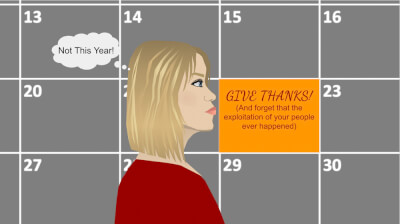Gratitude can be complicated. Generally, I endorse it — gratitude forces us to be reflective, mindful and aware: all that good well-rounded-human stuff. So, why have I developed a sneaking and subtle resentment toward a “holiday” promoting “nothing but gratitude”? Well, it’s because the ritual of Thanksgiving promotes a particular type of gratitude — one that is socially constructed, sensationalized, momentary and fleeting. It is a holiday built on cultural erasure and the genocide of Native Americans dressed up as a wholesome, family-oriented vacation.
Yet, year by year, we ignore it. Shedding off layers of guilt from our year of shallow living, we’re supposed to sit down at the dinner table and proclaim our gratitude for family and friends, for health and love and, of course: for the food. The food wouldn’t exist if it weren’t for the Native land and people, and this food is processed in ways that are now degrading that land and depleting those people. It is the most glaringly hypocritical holiday that exists, but the ritual of Thanksgiving is hard to opt out of when the institution we’re all tied to continually honors it. Occidental’s only two fall semester breaks align with Columbus Day weekend (as it is still nationally named, despite some more realistic renaming to Indigenous Peoples’ Day from cities like Seattle and Los Angeles) and Thanksgiving: both holidays that reflect the distinctly American tendency to commit atrocities to Native people and communities.
This Thanksgiving, I did not return home. Instead, I spent my Thursday night alone at an apartment in Highland Park. Overall, it was a painless night — I watched old movies and cuddled with a cute pooch. I’m not the first twenty-something to not see the worth in going home. Many of my peers stuck around or spent the “holiday” alone as well. Young adulthood is a common time to process and question the rituals and belief systems we take part in: from family traditions to political beliefs to academic interests.
So, question them. You have the power and may have the privilege to decide how you celebrate and participate in holidays blatantly built by colonizers. As an individual, you get to choose how you partake in the ritual of Thanksgiving. So does Occidental. It’s unfortunate and disappointing that the breaks we’re afforded in the long fall semester both reinforce the participation in and observation of holidays with deeply degrading histories. In fact, Occidental College posted on Instagram a thank-you to professors, staff and students on Thanksgiving Day — utilizing the easy framework of gratitude to ignore and diminish the darker nature of the holiday.
Here are some reminders: read these out loud to yourself, your friends, your neighbors, your doubtful family members, the next person you pass on the quad. Give these issues the legitimacy they deserve by using your voice to honor them.
- Up to 40 percent of households in areas of the Navajo Nation don’t have running water.
- North Dakota’s voter identification law discriminated against Native American voter participation in the November midterm election.
- Tribal people bear significant burdens from climate change, impacting health, economy and housing.
- Missing indigenous women and girls are less likely to be found, and perpetrators are less likely to be found guilty, due to an alarming lack of data and the higher likelihood of being murdered.
- A week before Thanksgiving this year, members of the Mashpee Wampanoag tribe — who helped the pilgrims survive 400 years ago — protested in Washington D.C. against the Trump administration’s decision to take their reservation away.
- The Cowboys vs. Redskin NFL game took place on Thanksgiving this year, an alarming example of how the sports industry continues to mock Native culture and utilizes harmful rhetoric to do so.
Instead of just posting an Instagram story on Thanksgiving, here are tangible ways to show your support.
- Directly donate to members of the Navajo Nation.
- Support Native individuals.
- Learn about, interact with and donate to Native Women’s Wilderness.
- Read Indigenous news organizations.
- Volunteer, donate and learn about Indigenous Climate Action.
- Support the Mitakuye Foundation — empowering Native youth and providing suicide prevention programming.
- Learn what Native land you are on.
- Buy music from A Tribe Called Red.
- Investigate and invent new ways to invest your resources in supporting Native communities and people.
The kind of gratitude Native tribes practice isn’t the single-day, passive, shallow or fleeting type — it is an ideological and social commitment to humility, honor and gratitude. It’s upsetting that what garners the most attention for Native communities are the complications and oppressions they face. We are still proving our existence and struggling for survival. At the same time, though, there are many people thriving, re-inventing and proclaiming their identity with pride. Native people aren’t just hidden away on reservations — they are your peers and friends, your politicians, your inspirations. They are the land you’re standing on, the food you’re eating, the spirituality of the earth, a reflection of inspirational resistance and the reason you should be giving thanks.
Rituals like Thanksgiving are not empty; they are full of implications and history for Native people. Start by thinking about this, reading about this, thinking some more about it, questioning your family’s traditions and understandings, and then put that brainpower into action. This will probably look different for everyone: progress relies on context. Celebrate Thanksgiving in different ways, give back to the cultures and communities that were taken from, expand your understanding of gratitude and relationship to the natural world to express itself in day to day actions and yes — go home and see your family — but don’t use that as an excuse for passive participation in a harmful holiday.
Stella Ramos is a sophomore religious studies major. She can be reached at sramos@oxy.edu.
![]()




































